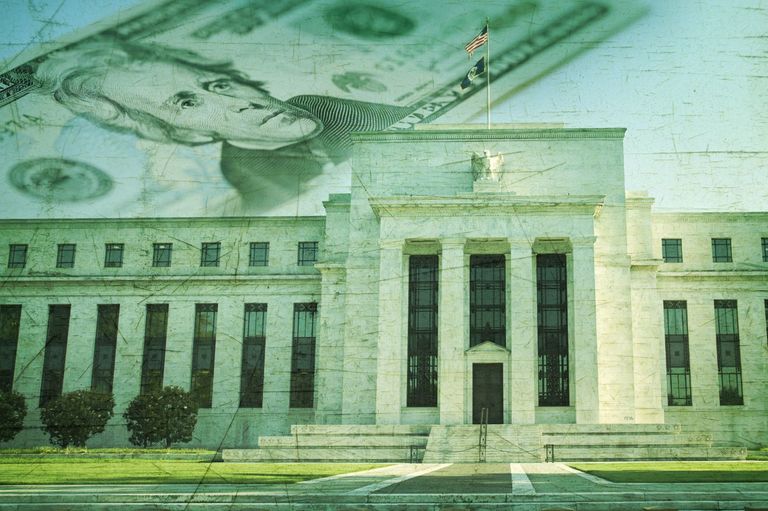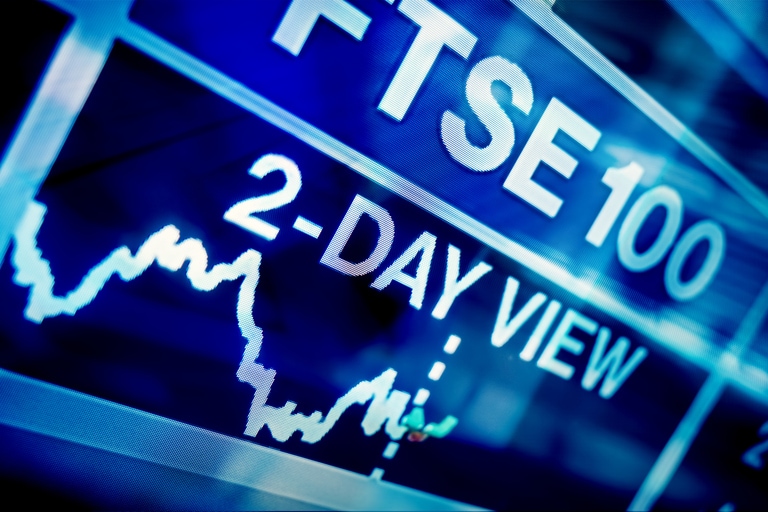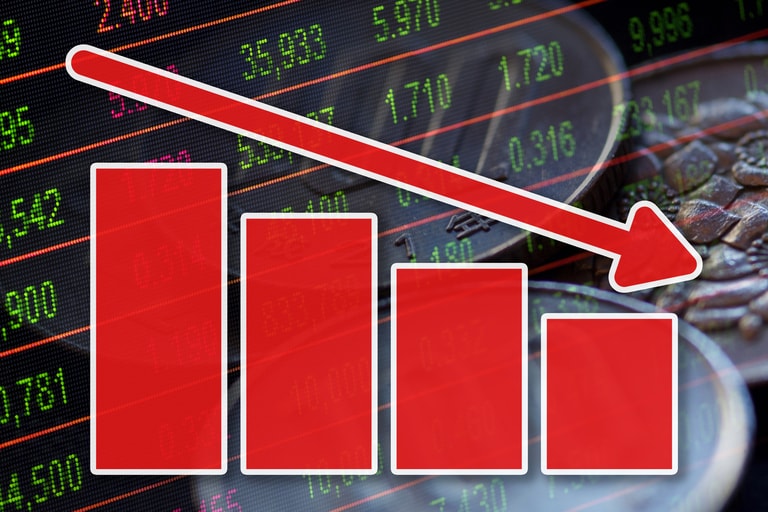The latest UK inflation data for October, alongside new UK chancellor Jeremy Hunt’s autumn statement, take centre stage on the macroeconomic front this week. After the headline CPI number rose to 10.1% in September, and core inflation edged up to 6.5%, all eyes will be on whether prices have continued to rise. Looking ahead, anticipated tax rises and spending cuts from Thursday’s mini-budget could play a part in slowing inflation. In earnings news, expect updates from Vodafone, BAE Systems, Walmart, Nvidia, and more.
OUR TOP THREE EVENTS: 14-18 NOVEMBER:
Tuesday: Vodafone half-year results
Vodafone’s Q1 numbers back in July were greeted with indifference, after the telecom giant reported a 1.6% rise in total revenue to €11.28bn, up from €11.1bn a year ago, with the shares drifting to their lowest levels since March 2020 in October. For years now the management has struggled to convince investors that they have a credible long-term plan for the business, pandemic disruptions notwithstanding, as well as a plan to reduce its debt levels. This weakness in the share price has made the company subject to bid speculation, which has thus far come to nothing, although Abu Dhabi’s Etisalat did purchase a 9.8% stake in the business in February.
In its Q1 numbers, the company’s German business recorded a revenue decline of 0.5%, however this was offset by a decent performance from its UK market. In August, Vodafone sold its Hungary operation to 4iG and Corvinus for €1.8bn. The shares also got a boost in September on reports that private equity firms KKR and Global Infrastructure Partners are looking to take a stake in the $13bn Vantage Towers business, of which Vodafone has an 82% stake. It also announced a new joint venture with Altice to implement fibre broadband in Germany to over 7 million homes.
Wednesday: UK consumer price index (October)
UK inflation got a bit of a respite in August, falling back to 9.9% from 10.1% in July, with the fall in petrol prices helping to pull the headline number back below double figures. This didn’t last very long though, as prices edged back to 10.1% in September, with food prices continuing to act as a tailwind, up from 13.1% to 14.6%.
The rise in core prices is also starting to become a larger concern, despite the stabilisation being seen in energy prices in the last few months. Having raised interest rates by 75bps last month, the Bank of England will be hoping that we don’t move too much higher than the 6.5%, and 40-year high, that prices edged up to in September. The new government’s fiscal plans could also play a part in slowing inflation, with the various tax rises and spending cuts. There’s no better way to slow inflation than to kill demand, which is what the government’s new plans look set to do.
Wages are holding up reasonably well on a historical basis, but remain well below headline inflation levels. More encouragingly, producer price index (PPI) inflation does appear to be showing signs of slowing, which could translate into lower inflation as we head into 2023.
Thursday: UK autumn statement
We should get final details of the various spending cuts and tax rises that the new government is set to earmark, when it comes to addressing the so-called £40bn black hole in the public finances. The last few weeks have seen UK gilt markets, as well as the pound, come under pressure over concerns about the sustainability of the UK’s public finances. Since the change of leadership at the top of government, these concerns have abated, as has the pressure on the pound and gilt yields.
What is more concerning is that the framing of the discussion hasn’t shifted at all in terms of convincing the markets that future spending plans will be properly scrutinised, compared with the damage that these measures will do to the economy. This fixation on what to all intents and purposes is an imaginary black hole, premised on a host of false assumptions, is likely to be hugely damaging to the UK economy. The market didn’t care when the government was spending almost £350bn on various Covid-19 support measures in the previous fiscal year, yet we’re supposed to believe that suddenly there’s huge concern about a £35bn fiscal hole that the government suddenly need to plug.
The UK government doesn’ t have to embark on a host of spending cuts on big infrastructure projects which are sorely needed if they are serious about levelling up. They simply have to convince the markets that they have a credible long-term economic plan they can implement over a five-10-year period, rather than impose a plan that no other country in Europe is pursuing. And where countries like Germany are spending billions of euros more in supporting their economies – without any penalty when it comes to borrowing costs.
KEY EVENTS OVERVIEW (14-18 NOVEMBER):
Monday 14 November
No major events scheduled.
Tuesday 15 November
China retail sales (October)
Last week’s China trade numbers for October showed that imports and exports fell into negative territory, speaking to the fact that the Chinese economy has continued to underperform. In August, consumer spending rebounded strongly, rising 5.4%, however this improvement wasn't sustained into September, as sales fell back to 2.5%. This suggests that the August pickup was primarily down to pent-up demand being released. China’s zero-Covid policy will continue to drive the numbers here, and while we’ve heard that the Chinese government is wargaming some reopening scenarios, prompting optimism that it could happen soon, this comes across as wishful thinking. With the weather starting to get colder and heading into winter, infections can only go one way. That fact will make any sort of reopening impossible unless China changes tack. This seems unlikely; therefore, we can expect to see many months of poor retail sales numbers as we head into 2023. October retail sales are likely to slow from September, with a rise of 0.7% expected. Industrial production is expected to slow from 6.3% to 5.2%.
UK Unemployment & average earnings (September)
If there was a silver lining with respect to the bleak economic outlook, then it’s in the form of a low unemployment rate, which fell to a 48-year low of 3.5% in the three months to August. Wage growth including bonuses also edged higher to 6% over the same period, but once again the focus was on the economic activity rate, which rose to a record high of 21.7%. The number of long-term sick rose to 2.5m, while job vacancies fell by a modest 46,000, to 1.25m. This remains the elephant in the room when it comes to the wider unemployment numbers, however vacancy rates still remain at elevated levels, which means that there’s unlikely to be a spike in unemployment levels in the short term.
BAE Systems Q3 results
One of the best performing companies this year on the FTSE 100 share price wise, the shares popped higher in the aftermath of Russia’s invasion of Ukraine, hitting a record high a month ago. In Q1, BAE said trading was in line with expectations, keeping full-year guidance unchanged, with sales expected to rise by 2% to 4% from 2021 levels, and underlying EPS growth of 4% to 6%. In July, BAE reported pre-tax profits of £779m, compared to the previous year’s £1.15bn, although revenues were higher, rising to £9.74bn. The main reason for the fall in profits was higher costs, which rose to £8.8bn. The company did see a big jump in orders, a 70% increase on last year to £17.9bn, which has resulted in a record order backlog of £52.7bn.
Walmart Q3 results
Having got their bad news in early, back in May and July, there was always a chance that in low balling expectations, Walmart Q2 numbers might come in better than expected. As a strategy in managing expectations, it worked with the US retailer reporting Q2 revenues of $152.86bn, and profits of $1.77c a share. The retailer maintained its outlook for the second half of the year, while improving its full year guidance for EPS to a decline of 9-11% from 11-13%. For Q3 Walmart said it expects to see revenues of $147.55bn and profits of $1.31c a share on slightly lower operating margins of 3.6%. Walmart also announced that it is set to make Paramount+ available to its Walmart+ subscribers from September to further take the fight to Amazon in the battle for annual or monthly subscription services.
Wednesday 16 November
UK CPI inflation
See our top three events, above
US retail sales (October)
While retail sales in the UK have been uniformly dire, the consumer in the US has been much more resilient despite similar price pressures, although the spikes seen in natural gas prices in the US have been nothing compared to those being seen in the UK and Europe. This is due to the US having in its own source of natural gas in the form of shale which has kept prices reasonably low. In September retail sales came in unchanged, while the previous month was revised up to 0.4%. On the control group measure this came in better than expected rising to 0.4%, which appears to show that despite rising prices consumers still have the appetite to spend money.
Cisco Systems Q1 results
Ever since Cisco posted a profits warning in May the shares have struggled to recover with the shares hitting their lowest levels since November 2020, back in October. We’ve seen a modest rebound since then, however the company has previously stated that the effects of supply chain disruptions, alongside problems in China are impacting its margins. Q4 revenues came in at $13.1bn, which was flat year over year, while profits came in at $0.83c a share. On a full year basis revenue rose by 3% to $51.6bn. The supply chain disruptions which the company cited in Q3 didn’t prove to be as challenging as originally thought. For the new fiscal year Cisco said it sees Q1 revenue growth of between 2% and 4%, which was above expectations, while profits are forecast to come in at $0.83c a share.
Nvidia Q3 results
Back in August Nvidia slashed its revenue outlook to $6.7bn while saying it expected gross margins to fall to 43.7% from 65.1%, potentially impacting profits as well. The downgrade was attributed to a big drop in gaming revenue which is down 44% from Q1, to just over $2bn. Its Q2 numbers confirmed that downgrade to guidance, with profits coming in at $0.52c a share and revenues coming in line at $6.7bn. For Q3 Nvidia was equally pessimistic about revenues, downgrading their outlook to $5.9bn, a big drop from estimates of $6.92bn suggesting that the slowdown in sales was likely to continue.
Target Q3 results
Target missed the mark on revenues and profits in Q2, sending the shares lower in early trade. Q2 revenues came in at $25.65bn, below expectations of $25.85bn, while profits came in at $0.39c a share, against a forecast of $0.77c. Operating margins fell sharply to 1.2% from 2.1% as the retailer cut prices to clear excess inventory. For the rest of the year Target says it still sees full year revenue growth in the low to mid-single digits.
Thursday 17 November
Burberry half-year results
Since hitting 18-month lows earlier this year Burberry shares have been on a slow recovery on expectation that after a weak Q1 the company’s sales numbers can only improve. The impact of Covid restrictions in China impacted the company’s Q1 sales after they reported an increase in sales of 1%. Without that disruption comparable store sales excluding the Chinese mainland saw a rise of 16%. The business in China saw a decline of 35%, while business in the US also slowed, falling 4%. Retail revenue came in at £505m for the 13-week period ending the 2nd July. Despite being adversely affected by the weakness in China, Burberry said it expects to maintain margins of 20% in the medium term, and to see £90m in adjusted operating profit for FY23.
UK mini-budget
See top three events, above
Williams-Sonoma Q3 results
With concerns about a US consumer slowdown manifesting themselves in weaker retail sales numbers Williams-Sonoma shares have slipped back from their early August peaks, although so far, they have remained above their lows of the year. When the company reported back in Q2 there was little sign of a slowdown in consumer spending with the owner of Pottery Barn reported record revenues of $2.14bn, a rise of 11.3%, although gross margins came down from 44.1% a year ago to 43.5%. In Q1 margins were at 43.8%. Profits still came in ahead of expectations at $3.87c a share with the company reiterating its full year guidance of mid to high single digital annual net revenue growth, with the goal of increasing annual revenues to $10bn by 2024.
Friday 18 November
UK retail sales (October)
The last two months have seen some pretty poor retail sales numbers, with declines of -1.7% on August and -1.4% in September. With the new energy price cap kicking in at the beginning of October it’s not hard to see that consumers have been reining back spending due to uncertainty over the lead up to October, as well as the farce that passes for our political institutions. While the September numbers were weighed down by the extra Bank Holiday due to the funeral of Queen Elizabeth II, this week’s October numbers aren’t expected to see a significant improvement. With consumer confidence already at or close to record lows, its likely that consumers, if they do have money to spend, are probably holding back ahead of the end of the year and the Christmas period.
Index dividend schedule
Dividend payments from an index's constituent shares can affect your trading account. View this week's index dividend schedule
Selected company results
| Monday 14 November | Results |
| BuzzFeed (US) | Q3 |
| Clear Secure (US) | Q3 |
| Getty Images (US) | Q3 |
| Tyson Foods (US) | Q4 |
| Tuesday 15 November | Results |
| BAE Systems (UK) | Q3 |
| Home Depot (US) | Q3 |
| Imperial Brands (UK) | Full-year |
| Land Securities (UK) | Half-year |
| Vodafone (UK) | Half-year |
| Walmart (US) | Q3 |
| Workspace (UK) | Half-year |
| Wednesday 16 November | Results |
| British Land (UK) | Half-year |
| Cisco Systems (US) | Q1 |
| Nvidia (US) | Q3 |
| Premier Foods (UK) | Half-year |
| Sage (UK) | Full-year |
| SSE (UK) | Half-year |
| Target (US) | Q3 |
| Thursday 17 November | Results |
| Burberry (UK) | Half-year |
| Esco Technologies (US) | Q4 |
| Grainger (UK) | Full-year |
| Halma (UK) | Half-year |
| Macy's (US) | Q3 |
| Mitie (UK) | Half-year |
| Palo Alto Networks (US) | Q1 |
| Williams-Sonoma (US) | Q3 |
| Friday 18 November | Results |
| Foot Locker (US) | Q3 |
Note: company announcements are subject to change. Dates are correct at the time of writing.
Disclaimer: CMC Markets is an execution-only service provider. The material (whether or not it states any opinions) is for general information purposes only, and does not take into account your personal circumstances or objectives. Nothing in this material is (or should be considered to be) financial, investment or other advice on which reliance should be placed. No opinion given in the material constitutes a recommendation by CMC Markets or the author that any particular investment, security, transaction or investment strategy is suitable for any specific person. The material has not been prepared in accordance with legal requirements designed to promote the independence of investment research. Although we are not specifically prevented from dealing before providing this material, we do not seek to take advantage of the material prior to its dissemination.







